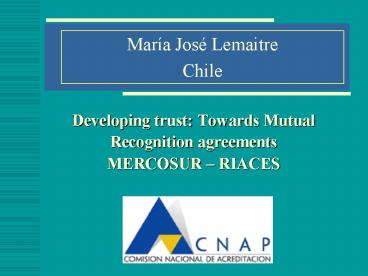Developing trust: Towards Mutual Recognition agreements MERCOSUR - PowerPoint PPT Presentation
1 / 21
Title:
Developing trust: Towards Mutual Recognition agreements MERCOSUR
Description:
Mar a Jos Lemaitre Chile Developing trust: Towards Mutual Recognition agreements MERCOSUR RIACES – PowerPoint PPT presentation
Number of Views:107
Avg rating:3.0/5.0
Title: Developing trust: Towards Mutual Recognition agreements MERCOSUR
1
Developing trust Towards Mutual Recognition
agreementsMERCOSUR RIACES
María José Lemaitre Chile
2
Requirements for mobility and recognition
- Trust on basic, shared quality requirements
- Quality wide and flexible definitions, able to
account for different options in HE - Standards for programmes, institutions and QA
agencies
3
Requirements for mobility and recognition
TRUST
- HE
Mobility
Recognition
STANDARDS
QUALITY
Accreditation
4
Trust
- Shared cultural elements
- Quality assurance mechanisms
- Need to develop substantive standards
- Need to establish standards for QA processes
5
Quality
- Diversity of HE
- Flexible definition of quality (internal and
external consistency) - Legibility of degrees and diplomas
- Qualifications frameworks
6
Standards
- Substantive standards contents of teaching and
learning, clear expected learning outcomes - Standards for quality assurance processes
procedures, GGP
7
The MERCOSUR experience
- Goal To make degrees comparable in the six
MERCOSUR countries - Conditions to respect national sovereignty and
institutional autonomy - Need to operate within national QA frameworks
8
MERCOSUR
9
Standards for accreditation
- Three expert groups, from the six countries
- Expected learning outcomes for three programmes
- Engineering
- Medicine
- Agronomy
- Conditions for operation (management, human
resources, curriculum development, teaching and
learning strategies, scholarship, learning
resources)
10
Definition of quality
- Quality defined as the combination of two main
aspects - External consistency (adjustment to requirements
from disciplinary and professional reference
group) - Internal consistency (ability to respond to
institutional principles and priorities
11
Quality assurance procedures
- Supranational arrangement, promptly rejected
- Need to reach an agreement that would allow for
mutual recognition of QA decisions - Agreement on a basic set of procedures
12
Quality assurance procedures (2)
- All countries agreed to base their decisions on
self assessment and external review reports - All agencies would use the standards developed
by the expert groups - External review teams must include members from
other two Mercosur countries - All external reviewers had to undergo Mercosur
training
13
Outcomes
- All countries recognize the decisions made by
the national agencies - Students from accredited programmes enjoy
enhanced opportunities for mobility - Bilateral agreements have been reached leading
towards automatic recognition of qualifications
of students from accredited programmes - Countries without QA agencies have established
their own
14
Red Iberoamericana para la Acreditación de la
Calidad de la Educación Superior
- RIACES
15
RIACES
- New network of QA agencies, government
organizations, associations of HE institutions,
and international organizations - Established in 2003, with participation of Latin
American countries and Spain - It received a grant from the World Bank to help
its development and the promotion of QA
activities in the region
16
RIACES
SPAIN
17
RIACES two strategic areas areas of involvement
- Capacity building of quality assurance agencies,
in order to promote their external recognition - Improvement of contents and procedures of
agencies in order to promote integration
18
Action plan Capacity building of quality
assurance agencies
- Component 1 Development of QA mechanisms within
the region - Seminar on good practices for QA
- Design and development of a handbook for the self
assessment of agencies - Component 2 Establishment of a regional
information center - Exchange of experiences and development of common
criteria for the assessment of graduate programs,
and of distance education - Updating of the RIACES glossary
- Component 3 Development of the technical staff
of QA agencies - Internships for technical staff in the more
experienced agencies within the region - Specific projects for consultancy or advice to
benefit the less developed agencies
19
Action plan Improvement of contents and
procedures of agencies
- Component 4 Development programs
- Workshops for harmonization of criteria on three
subject areas agronomy, engineering, medicine,
based on the MERCOSUR experience - Component 5 Training of external reviewers
- Participation of reviewers as observers in
external reviews for program and institutional
accreditation
20
Procedures
- International dialogue among QA agencies and
other stakeholders - Shared learning
- Adjustment of standards and procedures
- Development of mutual trust
- QA of accrediting agencies
- GGP
- Improvement of information systems
- Support to QA agencies
21
Final comments
- Globalization brings new challenges, that must be
anticipated and addressed with a long term and
global approach - Networking is essential, for developing trust,
for learning together, for building strong
constituencies, for standing up together to the
globalized world - National systems are essential, but international
support makes things more effective































